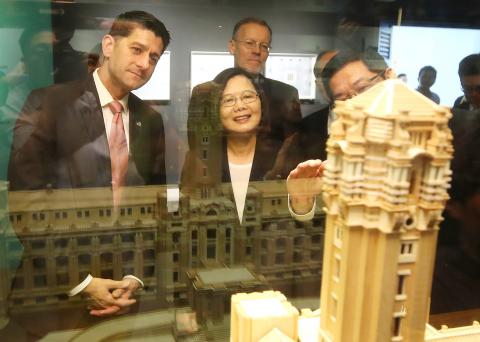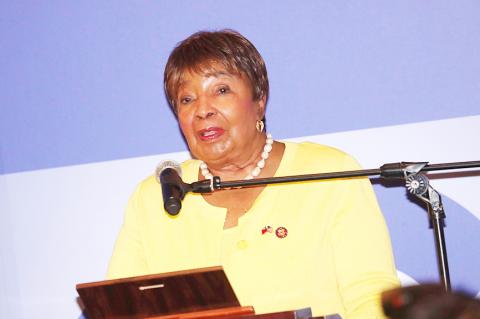The rest of the world should be more like Taiwan, former US House of Representatives speaker Paul Ryan said yesterday at an event at the American Institute in Taiwan’s (AIT) new facility in Taipei’s Neihu District (內湖) to mark 40 years of friendship between Taiwan and the US.
Ryan made the remarks at an afternoon banquet at the AIT compound, which is to officially open on May 6.
The US’ Taiwan Relations Act (TRA), enacted in 1979, was a rarity, as it had “absolute consensus” in Washington, he said.

PHOTO: CNA
“It is this deep, abiding friendship and bipartisanship that is a testament to the enduring friendship between our two countries,” Ryan said, adding that the anniversary of the passage of the TRA serves as a “picture-perfect display” of a wonderful foreign-policy achievement between Taipei and Washington.
The US could not ask for a better friend than Taiwan in its endeavor to carry out a strategy to ensure that freedom and openness flourish in the Indo-Pacific region, said Ryan, who served as House speaker from October 2015 to January.
What the US wants for the Indo-Pacific region is for it to be free, open, prosperous and innovative, and for the rest of the world to partner with the US in solving global problems, he said.

Photo: CNA
“In other words, we want the rest of the world to be more like Taiwan,” he said. “Taiwan actively uses its own experiences not only to help others, but to help others help themselves.”
“The world desperately needs more of Taiwan’s brand of leadership,” he said.
To celebrate the anniversary of the AIT’s establishment and the TRA’s enactment, AIT Director Brent Christensen said a special message of Taiwan-US friendship would be displayed on Taipei 101 to mark the milestone.
The message features a handshake symbolizing Taiwan-US ties and the display was to begin last night and would be shown for two more evenings, the AIT said.
AIT Chairman James Moriarty said in a speech that further progress across the many dimensions of the Taiwan-US partnership can be expected this year, including in the area of expanding people-to-people ties.
“In this regard, we welcome and look forward to exploring Taiwan’s interest in establishing preclearance operations at [Taiwan] Taoyuan International Airport,” Moriarty said.
According to US Customs and Border Protection, preclearance operations would allow US customs personnel to inspect travelers prior to boarding US-bound flights.
The US currently has 15 preclearance officials in six countries.
There is no firm timetable for the establishment of preclearance operations in Taiwan, as the process still requires more dialogue between the two sides, Moriarty told reporters after the opening ceremony at the banquet.
President Tsai Ing-wen (蔡英文) said that in today’s inter-connected world, it is vital that like-minded people move easily beyond their own borders.
“So we are ready, willing and able to work on including Taiwan in the US preclearance program to bring our people closer together,” Tsai said.
US Representative Eddie Bernice Johnson presented Tsai with a framed copy of a congratulatory resolution passed by the US Congress as part of Washington’s celebrations of the anniversary of the TRA’s implementation.
The event was also attended by Minister of Foreign Affairs Joseph Wu (吳釗燮), Taiwan Representative to the US Stanley Kao (高碩泰), Minister of National Defense Yen De-fa (嚴德發) and former president Ma Ying-jeou (馬英九), among others.

ENDEAVOR MANTA: The ship is programmed to automatically return to its designated home port and would self-destruct if seized by another party The Endeavor Manta, Taiwan’s first military-specification uncrewed surface vehicle (USV) tailor-made to operate in the Taiwan Strait in a bid to bolster the nation’s asymmetric combat capabilities made its first appearance at Kaohsiung’s Singda Harbor yesterday. Taking inspiration from Ukraine’s navy, which is using USVs to force Russia’s Black Sea fleet to take shelter within its own ports, CSBC Taiwan (台灣國際造船) established a research and development unit on USVs last year, CSBC chairman Huang Cheng-hung (黃正弘) said. With the exception of the satellite guidance system and the outboard motors — which were purchased from foreign companies that were not affiliated with Chinese-funded

PERMIT REVOKED: The influencer at a news conference said the National Immigration Agency was infringing on human rights and persecuting Chinese spouses Chinese influencer “Yaya in Taiwan” (亞亞在台灣) yesterday evening voluntarily left Taiwan, despite saying yesterday morning that she had “no intention” of leaving after her residence permit was revoked over her comments on Taiwan being “unified” with China by military force. The Ministry of the Interior yesterday had said that it could forcibly deport the influencer at midnight, but was considering taking a more flexible approach and beginning procedures this morning. The influencer, whose given name is Liu Zhenya (劉振亞), departed on a 8:45pm flight from Taipei International Airport (Songshan airport) to Fuzhou, China. Liu held a news conference at the airport at 7pm,

Authorities yesterday elaborated on the rules governing Employment Gold Cards after a US cardholder was barred from entering Taiwan for six years after working without a permit during a 2023 visit. American YouTuber LeLe Farley was barred after already being approved for an Employment Gold Card, he said in a video published on his channel on Saturday. Farley, who has more than 420,000 subscribers on his YouTube channel, was approved for his Gold Card last month, but was told at a check-in counter at the Los Angeles International Airport that he could not enter Taiwan. That was because he previously participated in two

SECURITY RISK: If there is a conflict between China and Taiwan, ‘there would likely be significant consequences to global economic and security interests,’ it said China remains the top military and cyber threat to the US and continues to make progress on capabilities to seize Taiwan, a report by US intelligence agencies said on Tuesday. The report provides an overview of the “collective insights” of top US intelligence agencies about the security threats to the US posed by foreign nations and criminal organizations. In its Annual Threat Assessment, the agencies divided threats facing the US into two broad categories, “nonstate transnational criminals and terrorists” and “major state actors,” with China, Russia, Iran and North Korea named. Of those countries, “China presents the most comprehensive and robust military threat